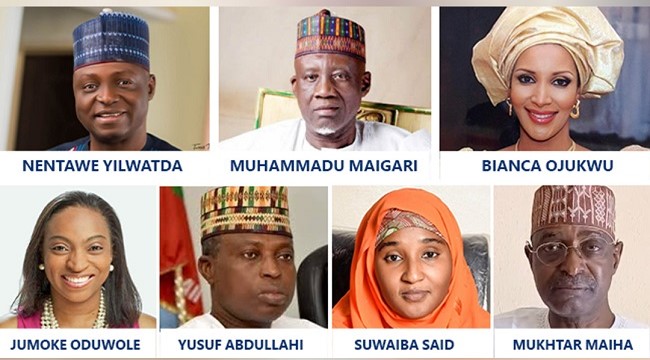Months after mounting calls for President Bola Tinubu to reshuffle his cabinet, the former Lagos State governor dismissed five of his ministers on Wednesday.
He also reassigned 10 ministers to new portfolios and appointed seven new ministers, subject to Senate confirmation.
Tinubu, a chieftain of the All Progressives Congress (APC), initially appointed 48 ministers in August 2023, three months after his inauguration. The Senate promptly screened and confirmed the ministers. One of them, Betta Edu, was suspended in January, while another, Simon Lalong, moved to the Senate.
There has been increasing pressure for the President to shake up his cabinet, as many Nigerians have expressed dissatisfaction with the performance of certain ministers, particularly given the unprecedented inflation, dire economic conditions, and rising insecurity.

In September, presidential spokesman Bayo Onanuga indicated that the President would indeed reshuffle his cabinet, but did not specify when the reorganisation would take place.
During the Federal Executive Council (FEC) meeting on Wednesday, the President dismissed Uju-Ken Ohanenye as Minister of Women’s Affairs; Lola Ade-John as Minister of Tourism; Tahir Mamman as Minister of Education; Abdullahi Gwarzo as Minister of State for Housing and Urban Development; and Jamila Ibrahim as Minister of Youth Development.
Tinubu then nominated Bianca Odumegwu-Ojukwu as Minister of State for Foreign Affairs and Nentawe Yilwatda as Minister for Humanitarian Affairs and Poverty Reduction, officially ending the tenure of suspended minister Betta Edu.
The President also nominated Maigari Dingyadi as Minister of Labour and Employment; Jumoke Oduwole as Minister of Industry; Idi Maiha as Minister for the newly created Ministry of Livestock Development; Yusuf Ata as Minister of State for Housing and Urban Development; and Suwaiba Ahmad as Minister of State for Education.
Earlier on Wednesday, Tinubu scrapped the Ministry of Niger Delta Development, replacing it with the Ministry of Regional Development, which will oversee the activities of all regional development commissions.
The regional development commissions now under the new ministry include the Niger Delta Development Commission, the South East Development Commission, the North East Development Commission, and the North West Development Commission.
Tinubu also abolished the Ministry of Sports Development, transferring its responsibilities to the National Sports Commission to “develop a vibrant sports economy.”
Additionally, the President approved the merger of the Federal Ministry of Tourism and the Federal Ministry of Arts and Culture, creating the Federal Ministry of Art, Culture, Tourism, and the Creative Economy.
The cabinet reshuffle also saw Sunday Dare, former Minister of Sports under the Muhammadu Buhari administration, receive a new appointment. Shehu Dikko was named Chairman of the National Sports Commission, while Sunday Akin Dare was appointed Special Adviser to the President on Public Communication and Orientation, working from the Ministry of Information and National Orientation.
The President thanked the outgoing members of the Federal Executive Council for their service to the nation and wished them well in their future endeavours. He urged the newly appointed ministers and their reassigned colleagues to view their roles as a call to serve the nation, emphasising the administration’s commitment to putting Nigeria on a path of irreversible growth, and encouraging them to invest their best efforts in achieving the government’s priorities.


